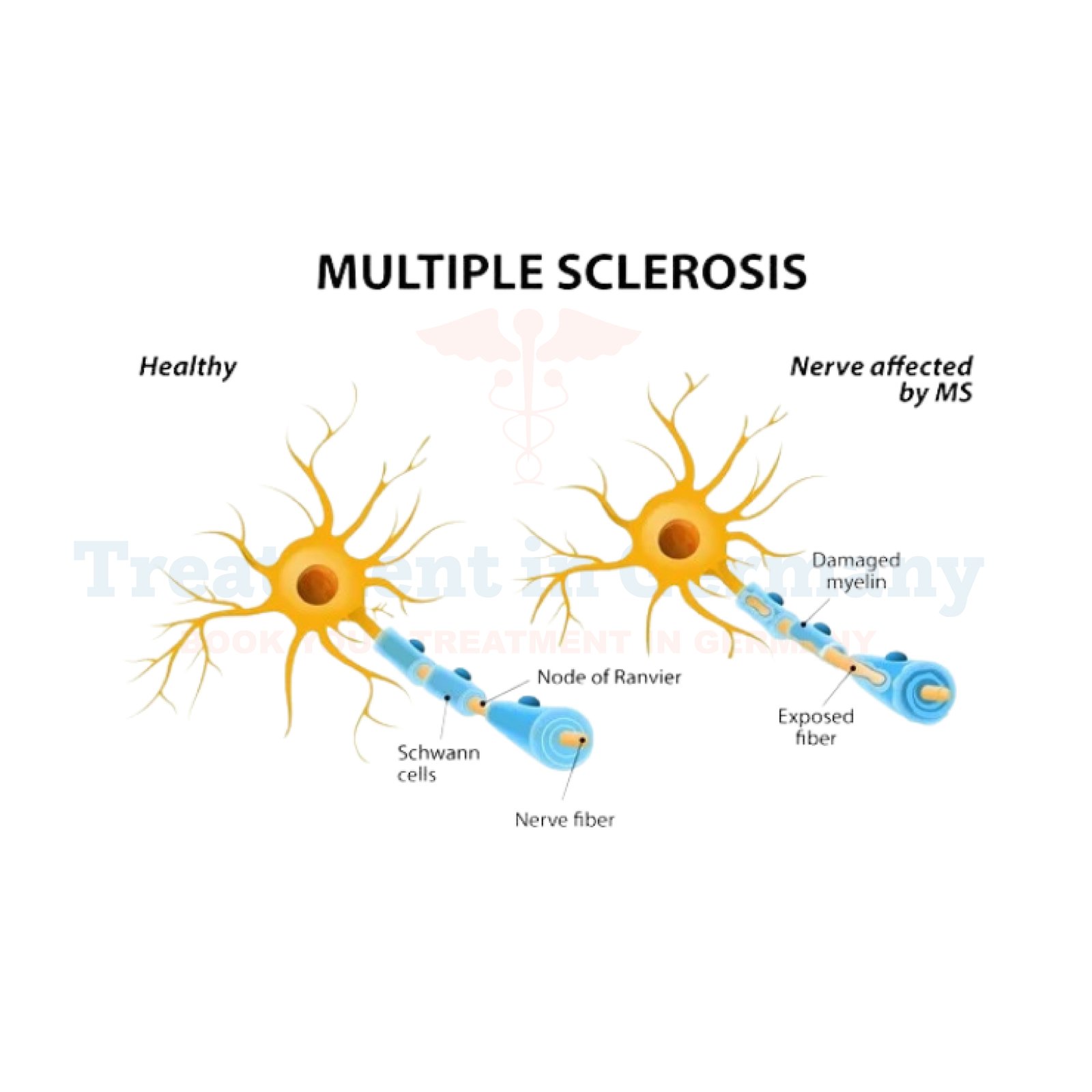Multiple Sclerosis (MS) Treatment in Germany
Multiple Sclerosis (MS) is a chronic autoimmune disease that affects the central nervous system, specifically the brain and spinal cord. This debilitating condition can cause a wide range of symptoms and progressively worsen over time. Germany is a global leader in providing advanced MS treatment, offering state-of-the-art therapies, research-backed approaches, and exceptional care.
Multiple Sclerosis occurs when the immune system mistakenly attacks the protective sheath (myelin) that covers nerve fibers. This disruption leads to communication issues between the brain and the rest of the body, ultimately causing nerve damage.
Types of MS
- Relapsing-Remitting MS (RRMS): The most common type, characterized by periods of new symptoms (relapses) followed by remission.
- Primary-Progressive MS (PPMS): A steady progression of symptoms without distinct relapses or remissions.
- Secondary-Progressive MS (SPMS): Initially begins as RRMS and later transitions to a more progressive form.
- Clinically Isolated Syndrome (CIS): A first episode of MS-like symptoms that may or may not progress to MS.
Risk Factors for MS
The exact cause of MS is unknown, but several factors increase the risk:
- Genetics: A family history of MS can elevate risk.
- Environmental Factors: Low Vitamin D levels and reduced sunlight exposure are linked to MS.
- Gender: Women are two to three times more likely to develop MS than men.
- Infections: Viruses like Epstein-Barr may trigger MS.
- Smoking: Increases the risk and accelerates disease progression.
- Autoimmune Diseases: Individuals with other autoimmune disorders are at higher risk.
Symptoms of Multiple Sclerosis
Symptoms of MS vary widely depending on the location and extent of nerve damage. Common symptoms include:
- Fatigue
- Difficulty walking or balance issues
- Numbness or tingling in limbs
- Vision problems (blurred or double vision)
- Muscle weakness or spasms
- Cognitive changes (memory or concentration issues)
- Bladder and bowel dysfunction
- Pain or tingling sensations
Diagnostic Tools for MS
Germany’s healthcare facilities use advanced diagnostic tools to accurately detect and monitor MS:
- Magnetic Resonance Imaging (MRI): Identifies lesions or damage in the brain and spinal cord.
- Lumbar Puncture (Spinal Tap): Analyzes cerebrospinal fluid for specific markers of MS.
- Evoked Potentials Tests: Measures electrical activity in response to stimuli to assess nerve damage.
- Blood Tests: Rules out other conditions with similar symptoms, such as infections or other autoimmune diseases.
Solutions to Prevent MS Progression
While MS cannot be cured, lifestyle adjustments and preventive measures can slow its progression:
- Balanced Diet: A diet rich in fruits, vegetables, and omega-3 fatty acids supports brain health.
- Regular Exercise: Improves strength, mobility, and mental well-being.
- Vitamin D Supplementation: Helps reduce the risk and progression of MS.
- Avoid Smoking: Smoking cessation lowers the risk of flare-ups.
- Stress Management: Mindfulness, meditation, or yoga can alleviate stress, which may trigger relapses.
- Adequate Sleep: Rest promotes nerve repair and overall health.
Treatment Options for MS in Germany
Germany offers a range of innovative and personalized treatments to manage MS effectively:
Disease-Modifying Therapies (DMTs)
- Injectable Medications: Reduce inflammation and the frequency of relapses.
- Oral Medications: Pills like fingolimod and dimethyl fumarate slow disease progression.
- Infusions: Monoclonal antibodies such as natalizumab target specific immune cells.
Symptom Management
Physical Therapy: Enhances mobility, balance, and muscle strength.
- Pain Relievers and Muscle Relaxants: Address muscle spasms and chronic pain.
- Bladder and Bowel Treatments: Medications or therapies to improve function.
Advanced Therapies
- Stem Cell Therapy: Rebuilds damaged nerve cells and restores function.
- Dendritic Cell Therapy: Modulates immune responses to reduce inflammation.
- Plasmapheresis: Removes harmful antibodies from the blood in severe cases.
Complementary Therapies
- Acupuncture: Helps manage pain and improve overall well-being.
- Mind-Body Therapies: Practices like tai chi and yoga promote relaxation and physical health.
Why Choose Germany for MS Treatment?
Germany is a top choice for MS patients due to its advanced medical infrastructure, expertise, and personalized care:
- Renowned Hospitals: State-of-the-art facilities equipped with the latest diagnostic and therapeutic tools.
- Expert Specialists: Neurologists and researchers with extensive experience in MS treatment.
- Innovative Therapies: Access to cutting-edge treatments, including stem cell and gene therapies.
- Holistic Care: Focus on physical, emotional, and psychological well-being.
- Clinical Trials: Participation in groundbreaking research for MS therapies.
- Comprehensive Support: Multilingual services and tailored treatment plans for international patients.
Conclusion
Multiple Sclerosis is a complex condition, but with early diagnosis and advanced care, patients can lead fulfilling lives. Germany’s healthcare system provides innovative treatments, expert care, and holistic approaches, making it a premier destination for MS management. From disease-modifying therapies to cutting-edge research, Germany offers hope and healing for those battling MS.
👉 Contact us for further information and receive a complimentary consultation.


.webp)
 (1).webp)

.webp)
 (1).webp)


.webp)
 (1).webp)

.webp)
 (1).webp)
